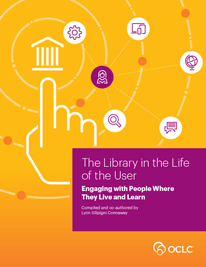
OCLC Research publishes ‘The Library in the Life of the User’
November 9, 2015
New compilation represents more than a decade of collaborative user studies research
DUBLIN, Ohio, 09 November 2015—OCLC Research has published a new compilation, The Library in the Life of the User: Engaging with People Where They Live and Learn, which represents more than a decade of collaborative work studying the information-seeking behaviors of library users.
Compiled and co-authored by Lynn Silipigni Connaway, findings from The Library in the Life of the User articulate the need for the design of future library services to be focused on the library user. The compilation is intended to provide a sequential overview of the findings of user behavior research for librarians, information scientists, and library and information science students and researchers as they think about new ways to provide user-centered library services.
“It is important to think of the library in the life of the user instead of the traditional model of the user in the life of the library,” according to Lorcan Dempsey, Vice President, OCLC Research and Chief Strategist. The findings in these studies illustrate how some library user behaviors have changed as new technologies emerge, while other behaviors remain constant.
Among the findings:
- People associate the library with books and do not consider the library in relation to online resources or reference services.
- People may not think of using libraries to get their information because they do not know that the services exist, and some of the existing services are not familiar or do not fit into their workflows.
- The context and situation of the information need often dictate how people behave and engage with technology.
- Engagement and relationship building in both the online and physical environments is important for the development of successful and effective services.
“We have heard from our study participants time and time again that there are more convenient and familiar ways of getting information today than from the traditional library, usually discovered through a Web browser, including freely available resources, such as Wikipedia; human resources; and library resources,” said Connaway.
“We also have learned that the context of the information need influences how and why people engage with technology and make their information choices. Convenience often is the reason expressed for the choices that people make about technology, and about the information and resources they use. Convenient does not necessarily mean simple since individuals constantly are evaluating and assessing the importance and necessity of their information needs.”
“This represents a fluid and ever-changing process, which makes it difficult to identify the one perfect way to provide information and services; making the saying, one size fits none, a reality,” stated Connaway.
The Library in the Life of the User includes a collection of work completed in the OCLC Research user studies theme. It represents more than a decade of work with colleagues from The Ohio State University and Rutgers, The State University of New Jersey, with funding from the Institute of Museum and Library Services (IMLS), and with Jisc, in collaboration with Oxford University and the University of North Carolina, Charlotte.
The Library in the Life of the User: Engaging with People Where They Live and Learn is available on the OCLC website.
About OCLC
OCLC is a nonprofit global library cooperative providing shared technology services, original research and community programs so that libraries can better fuel learning, research and innovation. Through OCLC, member libraries cooperatively produce and maintainWorldCat, the most comprehensive global network of data about library collections and services. Libraries gain efficiencies through OCLC’s WorldShare, a complete set of library management applications and services built on an open, cloud-based platform. It is through collaboration and sharing of the world’s collected knowledge that libraries can help people find answers they need to solve problems. Together as OCLC, member libraries, staff and partners make breakthroughs possible.
Add a new comment